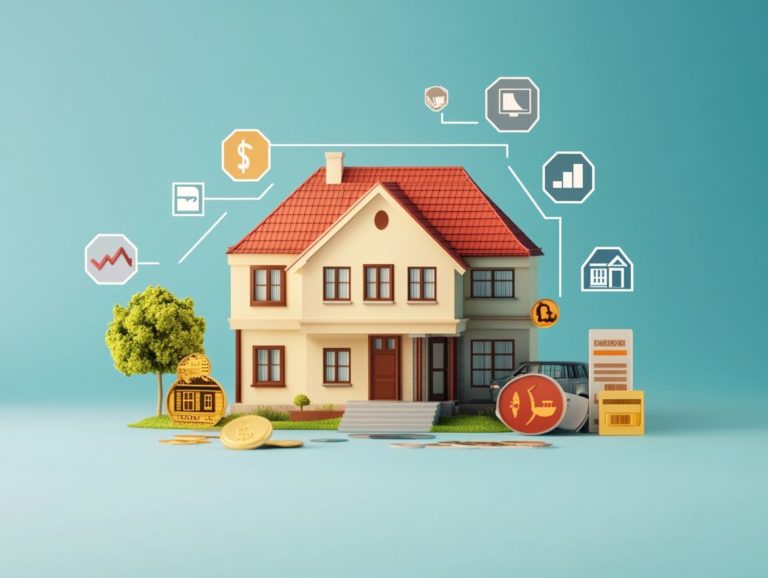Understanding Mortgage Pre-Approval Process
Ready to turn your dream home into a reality? Start with mortgage pre-approval!
Navigating the world of home buying can feel like a daunting journey, but one crucial step can make the process significantly easier: mortgage pre-approval. This essential tool not only clarifies your budget but also bolsters your position as a buyer in a competitive market.
This article delves into what mortgage pre-approval involves, the steps you need to take to secure it, and the myriad benefits it offers. You ll also find common misconceptions debunked and key factors that influence your pre-approval status discussed in detail.
By the end, you ll be fully equipped to take confident strides toward your new home.
Contents
Key Takeaways:

Understand the definition and importance of mortgage pre-approval to ensure a smoother home buying process.
Know the steps and requirements involved in obtaining a pre-approval, including factors like credit score and the ratio of your monthly debt payments to your monthly income.
Be aware of common misconceptions and the next steps to take after pre-approval is obtained.
What is Mortgage Pre-Approval?
Mortgage pre-approval is an essential milestone in your home buying journey, granting you a clear insight into your financial eligibility. It also helps you understand the budget you can work with, playing a pivotal role in shaping your house-hunting strategy. For more detailed guidance, check out what to expect during the mortgage application process.
To embark on this process, you ll need to submit a mortgage application to a lender. They will meticulously review your credit history, financial documents, and overall financial profile. In return, you ll receive a preapproval letter that outlines the terms of your potential financing, enabling you as you navigate the housing market.
How to Get Pre-Approved for a Mortgage
Securing pre-approval for a mortgage requires a well-organized approach. As a home buyer, you’ll need to gather a range of financial documents and engage in clear communication with a loan officer. This collaboration will help you understand the difference between pre-qualification and pre-approval, guiding you smoothly through the intricacies of the mortgage application process and ensuring you are well-prepared for your journey toward homeownership.
Benefits of Mortgage Pre-Approval
The advantages of mortgage pre-approval go well beyond simply understanding what you can afford. They grant you a competitive advantage in the real estate market by making you a more attractive buyer to sellers.
Pre-approval also gives you valuable insights into favorable mortgage options and interest rates, equipping you with the knowledge to make informed decisions.
Factors Affecting Mortgage Pre-Approval
Several key factors influence your mortgage pre-approval, such as your credit score, the ratio of your monthly debt payments to your monthly income, loan-to-value ratio, and your overall financial profile. Lenders carefully assess these elements to determine your eligibility for a mortgage.
Common Misconceptions about Pre-Approval

Despite its significance, you may find that many home buyers harbor misconceptions about the mortgage pre-approval process. They might mistakenly believe that securing a pre-approval guarantees loan approval.
In truth, it merely indicates potential eligibility based on an initial assessment of your financial profile.
Next Steps After Getting Pre-Approved
Once you receive your preapproval letter, the next steps involve strategically planning your house-hunting efforts. You’ll want to dive deep into understanding your mortgage options and prepare meticulously for the closing process, all to ensure you secure your dream home.
Definition and Importance
Understanding the definition and importance of mortgage pre-approval is essential for you as a home buyer. It serves as a foundational step in your journey, helping you grasp your financial standing in the competitive real estate market.
With a preapproval letter in hand, you can navigate your options with confidence, fully aware of how much you can afford. This document not only clarifies your budget constraints but also positions you as a serious contender in the eyes of sellers.
In a crowded marketplace where multiple offers are the norm, having pre-approval underscores your financial credibility, fostering trust and potentially giving you an edge over those without such assurances. Therefore, recognizing the significance of this step can greatly enhance your home buying experience and improve your negotiation outcomes.
Don’t wait take the first step toward your dream home today!
Steps and Requirements
Getting pre-approved for a mortgage means working closely with a loan officer. You ll need to submit important financial documents for review.
To start this journey, gather essential documents like tax returns, pay stubs, and bank statements. These help lenders understand your financial stability.
Simplifying your approach to a loan officer begins with researching local lenders. Schedule a consultation to discuss your options, articulating your financial goals while the officer provides tailored insights for your unique circumstances.
Mortgage lenders play a pivotal role by evaluating your documents and guiding you toward the most suitable loan products, streamlining your path to homeownership.
Advantages for Home Buyers
Mortgage pre-approval offers many benefits for home buyers. It gives you clarity on your options and ensures a smoother closing process.
This proactive approach helps you establish a realistic budget and gives you a competitive edge in a busy real estate market. With pre-approval in hand, you can act quickly when the perfect property catches your eye, increasing your chances of securing the deal before someone else swoops in.
Being pre-approved sends a strong message to sellers, showing you are serious and financially capable. This opens up exciting opportunities for better negotiations and potentially better terms for your purchase.
Credit Score, Income, and Debt-to-Income Ratio

Your credit score, income, and how much you owe compared to what you earn are key factors. They shape your financial profile and eligibility.
These factors significantly influence how lenders perceive your reliability. A higher credit score reflects responsible credit usage, leading to better interest rates and terms.
On the flip side, low income levels may raise concerns about your ability to make timely payments, while a high debt-to-income ratio could suggest financial strain, impacting your approval decision.
As a homebuyer, it s wise to evaluate your credit status, ensure your income is stable, and manage your debts effectively to bolster confidence in your mortgage application.
Dispelling Myths and Clarifying Expectations
Understanding the truth behind mortgage pre-approval is essential for homebuyers. Misunderstandings can lead to false expectations and complicate your home-buying journey.
Many mistakenly believe pre-approval guarantees loan approval. While it provides insight into how much a lender is willing to offer, final approval depends on factors like your creditworthiness and property appraisal.
You might think pre-approval means you must jump straight into home shopping. In reality, it serves as a valuable tool for understanding your budget and refining your options.
By grasping these nuances, you can navigate the process more effectively and make informed decisions about your future investments.
What to Do Before and During House Hunting
Before you start house hunting, use your preapproval letter wisely. Consult with your loan officer and explore your mortgage options. This knowledge enables you to make informed decisions about your potential home purchase.
Think of your preapproval letter as your secret weapon it showcases your seriousness to both sellers and real estate agents. When working with agents, be open about your budget and preferences, allowing them to tailor the search to your exact needs.
Acting swiftly on properties that catch your eye is advantageous; a strong offer backed by your preapproval can truly set you apart in competitive markets.
Consider adding a personal touch by writing a letter to accompany your offer. This can evoke an emotional connection with the sellers and may just tip the scales in your favor.
Frequently Asked Questions
What is the purpose of a mortgage pre-approval?
A mortgage pre-approval is a crucial step in buying a home. It helps you find out how much you can borrow, which clarifies your budget.
How do I obtain a mortgage pre-approval?

You can get a mortgage pre-approval by filling out a loan application with a lender. You ll need to provide financial documents for this process.
How long does a mortgage pre-approval last?
A mortgage pre-approval usually lasts between 60 and 90 days. After this, you might need to update your financial info for the lender to reassess your eligibility.
What factors are considered in a mortgage pre-approval?
Lenders look at your credit score, income, employment history, and how much you owe compared to what you earn. They also consider the type of mortgage you’re after and your down payment.
Can a mortgage pre-approval be denied?
Yes, if your financial situation changes or if there are discrepancies in your information, it can be denied. Stay stable financially and provide accurate information to boost your chances of approval.
Does a mortgage pre-approval guarantee a loan?
Keep in mind, a mortgage pre-approval does not guarantee you will get a loan! It s just an estimate based on your finances at the time of application. Final approval depends on factors like a satisfactory appraisal of the property you want to buy.





